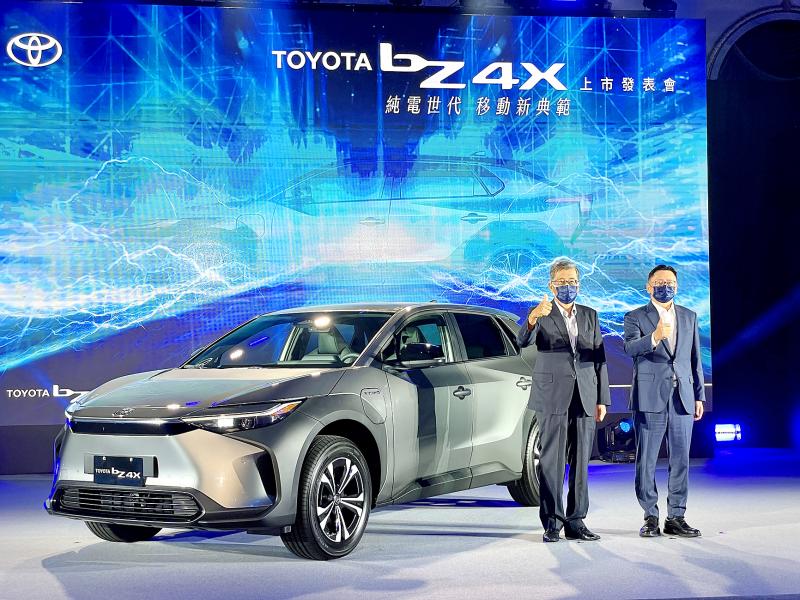Hotai Motor Co (和泰汽車), which distributes Toyota and Lexus vehicles in Taiwan, yesterday introduced Toyota Motor Corp’s first all-electric sports utility vehicle (SUV), the bZ4X, joining rivals in vying for a share of the nation’s fast-growing electric vehicle market.
Starting today, the bZ4X, with a price tag of NT$1.599 million (US$53,780), would be available for online purchase only and customers need to download a special app to place orders, Hotai said.
Hotai has received 300 of the electric SUVs, it said, adding that it is not enough to meet robust market demand.

Photo: Amy Yang, Taipei Times
A total of 229 electric vehicles were sold in the nation last month alone, led by BMW AG models distributed by Pan German Universal Motors Ltd (汎德永業).
Hotai expects sales of new electric vehicles to nearly double to 13,000 units this year, from 6,982 units last year. That means new electric vehicle sales would account for 2.8 percent of forecast overall new vehicle sales of 460,000 units.
“Taiwan’s electric vehicle market entered a rapid growth phase in 2019,” Hotai president Justin Su (蘇純興) told a news conference in Taipei yesterday. “In 2025, electric vehicle sales will reach 22,000 units, making up about 5 percent of overall new car sales.”
Taiwan plans to ban sales of new gasoline-fueled vehicles by 2040, as it aims to become carbon neutral by 2050.
The bZ4X is the first model from Toyota’s 30-strong EV lineup that it plans to build by 2030. Its batteries can go from a low state of charge to 80 percent full in 30 minutes.
More than 150 electric charging piles, including fast-charging and regular types, are available for car owners to charge their vehicles, Hotai said.
The piles were built by Hotai and its partner Fortune Electric Co (華城電機).
Hotai reported a net profit of NT$4.29 billion for the first three months of this year, down about 14 percent from NT$5 billion a year earlier. Earnings per share dropped to NT$7.86 last quarter, from NT$9.16 a year earlier.
Hotai said that an ongoing semiconductor shortage has curbed sales of Lexus and some Toyota models imported from Japan.

Quanta Computer Inc (廣達) chairman Barry Lam (林百里) is expected to share his views about the artificial intelligence (AI) industry’s prospects during his speech at the company’s 37th anniversary ceremony, as AI servers have become a new growth engine for the equipment manufacturing service provider. Lam’s speech is much anticipated, as Quanta has risen as one of the world’s major AI server suppliers. The company reported a 30 percent year-on-year growth in consolidated revenue to NT$1.41 trillion (US$43.35 billion) last year, thanks to fast-growing demand for servers, especially those with AI capabilities. The company told investors in November last year that

Intel Corp has named Tasha Chuang (莊蓓瑜) to lead Intel Taiwan in a bid to reinforce relations between the company and its Taiwanese partners. The appointment of Chuang as general manager for Intel Taiwan takes effect on Thursday, the firm said in a statement yesterday. Chuang is to lead her team in Taiwan to pursue product development and sales growth in an effort to reinforce the company’s ties with its partners and clients, Intel said. Chuang was previously in charge of managing Intel’s ties with leading Taiwanese PC brand Asustek Computer Inc (華碩), which included helping Asustek strengthen its global businesses, the company

Taiwanese suppliers to Taiwan Semiconductor Manufacturing Co. (TSMC, 台積電) are expected to follow the contract chipmaker’s step to invest in the US, but their relocation may be seven to eight years away, Minister of Economic Affairs J.W. Kuo (郭智輝) said yesterday. When asked by opposition Chinese Nationalist Party (KMT) Legislator Niu Hsu-ting (牛煦庭) in the legislature about growing concerns that TSMC’s huge investments in the US will prompt its suppliers to follow suit, Kuo said based on the chipmaker’s current limited production volume, it is unlikely to lead its supply chain to go there for now. “Unless TSMC completes its planned six

TikTok abounds with viral videos accusing prestigious brands of secretly manufacturing luxury goods in China so they can be sold at cut prices. However, while these “revelations” are spurious, behind them lurks a well-oiled machine for selling counterfeit goods that is making the most of the confusion surrounding trade tariffs. Chinese content creators who portray themselves as workers or subcontractors in the luxury goods business claim that Beijing has lifted confidentiality clauses on local subcontractors as a way to respond to the huge hike in customs duties imposed on China by US President Donald Trump. They say this Chinese decision, of which Agence